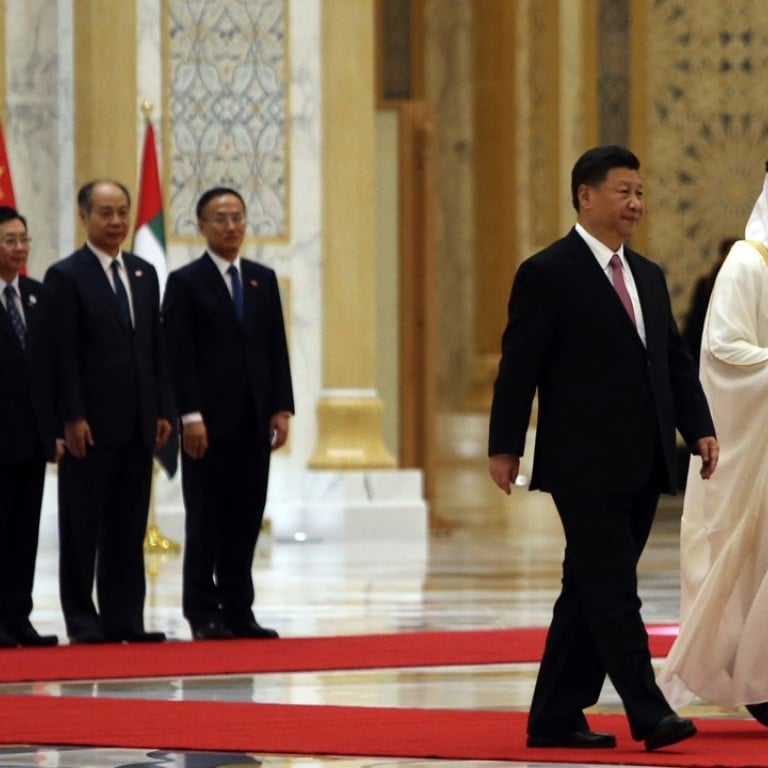
Red-carpet welcome for Chinese President Xi Jinping in United Arab Emirates, ‘gateway to Middle East’
Trip meant as show of support for multilateralism and contrast to US protectionism, analyst says
The United Arab Emirates rolled out the red carpet for Chinese President Xi Jinping for the first stop on his trip to the Middle East and Africa as China seeks closer ties with the region.
The UAE sent 12 F-16s and Mirage aircraft to escort the Chinese leader’s plane into Abu Dhabi on Thursday and gave Xi and his wife Peng Liyuan a 21-gun salute on arrival.
After his three-day stay at the Gulf state – the first by a Chinese leader in nearly three decades, Xi will head to Senegal, Rwanda and South Africa for the BRICS summit in Johannesburg, before stopping over in Mauritius on the way home.
It is Xi’s first overseas trip since the start of his second term in March, and comes as China and the United States are on the brink of a full-scale trade war.
China seeks emerging economies’ support for pushback on US tariffs
Peking University international relations professor Wang Lian said the trip was intended to show China’s support for multilateralism.
“It also forms a contrast with the US’ ‘America first’ policy, and protective diplomatic measures in trade,” Wang said.
China is the UAE’s top trading partner and trade between the two states amounted to more than US$50 billion last year, according to Abu Dhabi’s finance ministry.
Before the trip, state-owned Abu Dhabi National Oil Company announced it had awarded US$1.6 billion in contracts to oil giant China National Petroleum Corporation, to conduct a massive offshore and onshore seismic survey. The UAE’s DP World also announced that the two states had agreed to build a new trade zone in Dubai.
For China, which imports most of its oil and gas, oil-rich Abu Dhabi is not only an important trade partner but also a gateway to the rest of the energy-rich Middle East, according to Tugrul Keskin, director of Shanghai University’s Centre for Global Governance.
“China receives more than 50 per cent of its energy through the Persian/Arab Gulf. Therefore, the UAE is an important second-tier country for China to develop its economic relations with,” Keskin said. “Energy is a very important aspect of Chinese economic development.”
Wang said the UAE was an important link for China to the rest of the region.
“As an Arab country, the UAE is rather developed and modern … It is a bridge and a window to the Islamic world for China, helping us to connect further into North and West Africa,” Wang said.
Escalating the US trade war is not in China’s interest. Reform is what it must do
China was also the biggest contributor of foreign direct investment, capital and jobs in Africa in 2016, according to Ernst & Young. But Senegal, Rwanda and Mauritius were not among Chinese top partners in the continent.
Wang said these countries were not comparable to China in terms of economic development and size, but the trip was to present to the world a clear picture of the Chinese diplomacy model.
“It carries a message that no matter whether big or small, countries would be treated as equals by China, and China is interested not just in working with powerful countries as it continues to rise in the world stage,” Wang said.

